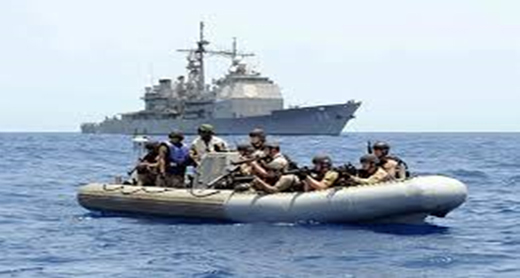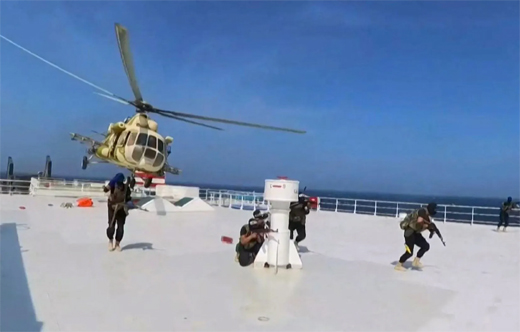Houthi terrorists reddening the Red Sea
Houthi terrorists reddening the Red Sea
Mangalore Today News Network
By Dr. G. Shreekumar Menon
Mangaluru, Jan 1, 2024: The Red sea has started reddening, as drones and ballistic missiles, unleashed by the Houthis, target ships and ocean going vessels, with deadly accuracy. The Red Sea directly feeds into the Suez Canal, the only water route available for ships traveling from Asia to Europe without having to sail around the African continent, and thereby save over 30 days in travel time. So far in 2023 around 24,000 vessels have plied the passage, accounting for some 10% of global seaborne trade by volume, according to Clarkson’s, a shipbroker. That includes 20% of the world’s container traffic, nearly 10% of seaborne oil and 8% of liquefied natural gas. Attacks from the Houthis began during the Israel-Hamas war when the militant terror group vowed to attack all ships stopping at Israeli ports.

The Houthis owe allegiance to the Zaydi branch of Islam and make up about 35% of the population of Yemen. The Zaydi branch does not view the Saudi-influenced Salafi Islam favourably as they believe that it is interfering with their cultural heritage and rights. The Houthis were originally known as ‘Believing Youth’, but in 2004, the group came to be known as ‘Houthis’ after their leader Hussein al-Houthi was killed. They are also known as Ansar Allah meaning ‘Supporters of God’. They began their terror career by launching insurgencies against Yemen’s government.
Saudi Arabia has been hounding the Houthis, and because of this, the Houthis have grown more aligned with Iran. The Houthis have started interfering in the Israel-Hamas conflict by directly targeting at ships that were stopping in either Ashdod or Haifa, prominent port cities of Israel, but any vessel that is transiting through this region and heading to an Israeli port is also at risk. Houthis have control over a major part of Sanaa and the north of Yemen, as well as the Red Sea coastline, hence can hit vessels as they please. This has resulted in immediate suspension of transits through the Red Sea by many shipping companies like Maersk, MSC, Hapag-Lloyd, and CMA CGM, apart from oil giant British Petroleum.
So far, the Houthis have deployed direct-attack drones, anti-ship missiles, and even physically seized a merchant ship via helicopter landing. A missile attack on the MSC Palatium III and the earlier assault on the Al Jasrah, has put many nations on the alert. Indian interests also took a hit when India-bound MV Chem Pluto with 21 Indian crew was hit by a projectile. Hours later crude carrier MV Sai Baba with 25 Indians on board faced a drone attack in the southern Red Sea. The U.S. has been quick to form a multi-national naval task force – Operation Prosperity Guardian (OPG), in which the U.K., Bahrain, Canada, France, Italy, the Netherlands, Norway, and Spain, are also participating. American warship, the USS Carney shot down 14 drones launched by the Houthis, but nobody can guarantee that every missile or drone can be intercepted and destroyed. Meanwhile the Houthis are also preparing for a full scale war, if needed by recruiting thousands of Yemenis, including young boys.

The Houthis have been encouraging individuals in densely populated regions under their control to undergo military training as part of their planned mobilization efforts to help Palestinians in their fight against Israel. Though such individual fighter volunteers are not regular army recruits, the possibility that such desperadoes can be instigated to go and fight alongside the beleaguered Palestinians, can contribute to the battle dragging on interminably. But military analysts believe that they do not have the military, geographical, or political resources to deploy anybody to Gaza.
The outbreak of another war in the Middle East, can have far reaching implications for the entire world economy due to increased transportation costs, as well as rising fuel and energy costs for end users. Crude oil prices would be the first to be affected. The U.S. plunging into another war zone, apart from the meddling that it is engaged in doing in the Russia-Ukraine conflict, can be quite upsetting for the American economy.
Meanwhile, the Houthis are flush with the new found confidence that they have been able to rattle the global sea trade via the Red Sea. They have also been threatening to disrupt the global internet cables which pass through the Bab-el-Mandeb strait. Submarine cables are the backbone of the global communication, and software industry and any disruption to them can have disastrous consequences. The vulnerability of submarine cables is not a new security concern, with the Red Sea region emerging as a significant choke point for internet traffic due to the heavy density of cables passing through it. The Red Sea, being a shallow body of water, has been experiencing cable cuts, and the disruption that it can cause. Any terror group which wants to create mayhem would find it an attractive target to strike at, as it can cause maximum disruption with minimum casualty. Martin Luther King correctly observed “This is an age of guided missiles and misguided men”, a sign of the progressive degeneration of the global mind-set.
 Dr. G. Shreekumar Menon, IRS (Rtd), Ph.D. (Narcotics)
Dr. G. Shreekumar Menon, IRS (Rtd), Ph.D. (Narcotics)
Former Director General of National Academy of Customs Indirect Taxes and Narcotics & Multi-Disciplinary School Of Economic Intelligence India; Fellow, James Martin Centre For Non Proliferation Studies, USA; Fellow, Centre for International Trade & Security, University of Georgia, USA; Public Administration, Maxwell School of Public Administration, Syracuse University, U.S.A.; AOTS Scholar, Japan. He can be contacted at shreemenon48@gmail.com
- Need For ‘Students, Alcohol and Drugs’ survey
- New Synthetic Drugs Trapping Youth
- Mood Modifying Chips - Future of Drug Use
- Ramping up Indo-Bangla border security
- IITM- A premier educational Institution in a forest. What can we learn?
- Former PM, Manmohan Singh: Notable laws passed under his tenure
- Hashish on Ratnagiri Seashore
- The Poor cry out to Us: Do we respond?
- Clandestine Meth Labs Sprouting Across India
- Hydro ganja from Bangkok latest craze among youth in India
- "Memories to Treasure" Dr.Michael Lobo’s new book
- Dominance of Private Universities: Will it make education inaccessible to underprivileged students?
- Monti Phest: A rich heritage of South Canara
- Kashmir Bhavan in Bengaluru: A must visit place
- "MAI and I" Book of Angelic Emotions
- Draupadi Murmu - The New ’President of India’
- Anthony Ashram in the city grows a classic museum
- First College of Fisheries in India - A Golden Jubilarian
- Flushing Meadows - A Vintage Mansion
- The Colonel�s Bequest
- A Mangalorean PM and his RBI Governor Brother: The Extraordinary story of the Benegal Brothers
- There is no higher religion than Truth: Theosophical Society
- L�affaire - Ashu & Yiju of Mangalore
- Mangalore in Kowloon
- 1568 to 2018 AD: 450 years of Christianity in Mangaluru
- Vice President elect Naidu moves on from nadir to zenith, the phenomenal journey
- Embracing the Outdoors: How Heated Jackets Are Revolutionizing Cold Weather Activities
- Efficient and Sustainable Packaging Solutions with FIBCs
- The Hybrid Kilt Revolution | Where Tradition Gets Trendy
- Affordable Elegance | Embrace Style on a Budget with Cheap Kilts
- Unleashing Style and Functionality | Exploring Tactical Kilts
- Mangalore’s Heroic Lady marks 105th Birthday
- Santa the Christmas spirit
- Geriatric care: Mangalore strikes a fine balance
- The Don Who Made Two Empires to Clash
- CHITRAPUR SARASWATS - A Great Kanara Community
- Our new President Ram Nath Kovind’s significant journey to Rashtrapathi Bhavan
- Marriages made in heaven, big fat weddings made in India
- Eid insight - The giver of glad tidings
- CITY INFORMATION
- TRAVEL
- TOURIST INFORMATION
- HEALTH CARE
- MISCELLANEOUS




 Write Comment
Write Comment E-Mail To a Friend
E-Mail To a Friend Facebook
Facebook Twitter
Twitter  Print
Print 


